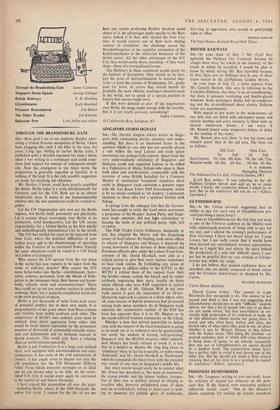GLYNDEBOURNE SIR,—Is Mr. Cairns seriously suggesting that an ability to
pay for one's seat at Glyndebourne pre- vents one being a music lover?
I went to Glyndebourne for the first time last week as one of the frivolous audience in the blissful (and fully appreciated) position of being able to pay for my seat, and I adored the evening's performance of Don Giovanni. I have not heard Elegy for Young Lovers, but I am sadly aware that it would have been beyond my conventional musical appreciation. Much as I regret this, and admire the spirit behind the production of a new and 'difficult' opera, I can- not but be grateful that my rare evening at Glynde- bourne was within 'my range.
I do not believe that musical audiences there or anywhere else are chiefly composed of music critics and the frivolous ticket-buyers so despised by Mr. Cairns.
[David Cairns writes : 'The answer to Lady Bearsted's first paragraph is no. The answer to her second and third is that I was not suggesting that Glyndebourne should put on only "difficult," modern operas, nor that a lot of people who pay to go there are not music lovers, but that nevertheless an un- usually high proportion of its audiences is made up of rich philistines whose motive for going there is social and who often have, before and after, the haziest idea of what opera they paid to see, let alone whether it was by Mozart, Strauss or that fellow with the Italian name. This being the position—an assured audience, part of which will come whatever is being done—it seems to me entirely reasonable that one out of Glyndebourne's six operas should be a modern work. The conservative music lover has a perfect right to avoid it and choose one of the other five. But he should not mind a little critical rejoicing that art for once is in a position to exploit its exploiters.'—Editor, Spectator.]


































 Previous page
Previous page